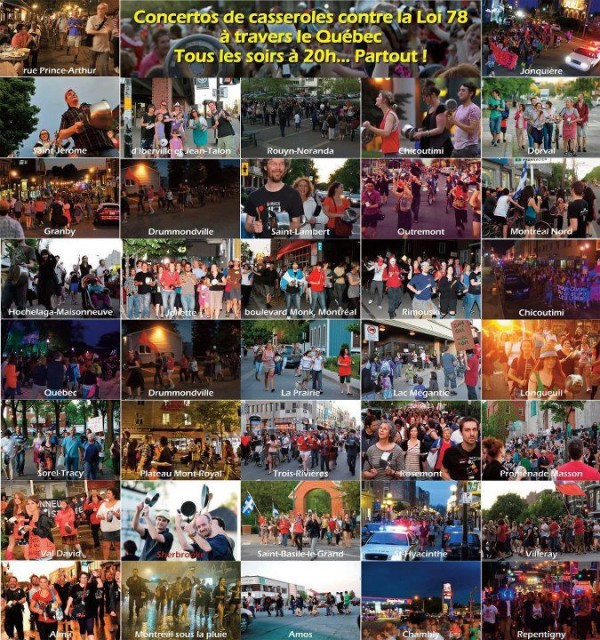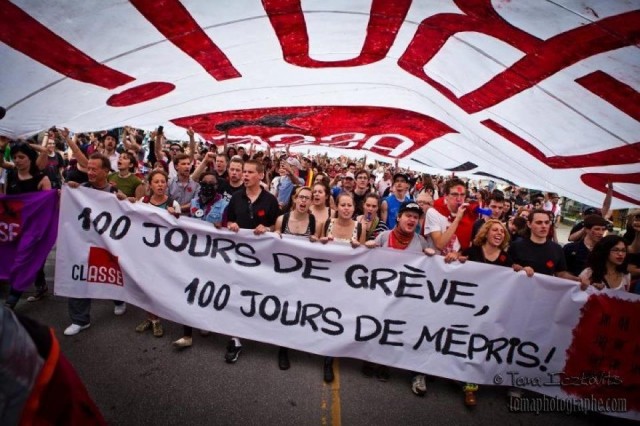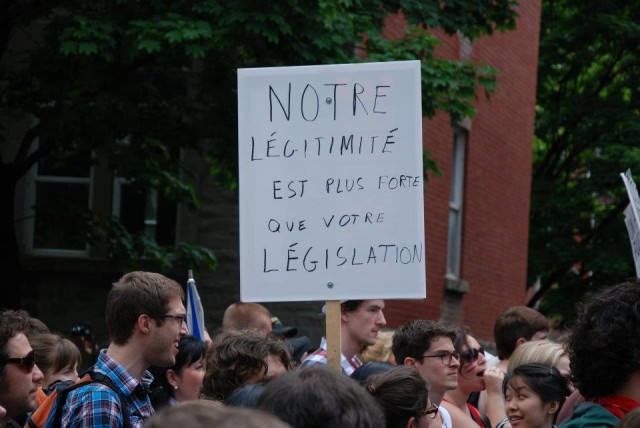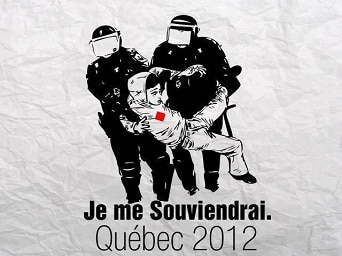 by Anthony Hall
by Anthony Hall
revised
Le Printemps érable in Quebec has become the most recent extension of the movement that started with the Arab Spring and then moved to Spain where the Indignados helped prepare the way for Occupy Wall Street. The long history of French-speaking resistance to to the English-speaking domination of North America has infused verve into the genesis of this spirited and well organized protest. The Maple Spring in Quebec is peopled by activists who refuse to accept the stale orthodoxies of a failed system of political economy that has run contrary to the public interest for more than a generation.

Guillaume Nadeau-Dubois is emerging as the activist rock star of le Printemps érable. The term translates roughly as the Maple Spring or the Maple Syrup Spring. This play on words helps to invoke some of the same regenerative energy that was called forth when the sweet sap of self-empowerment began to flow in the early stirrings of the Arab Spring.
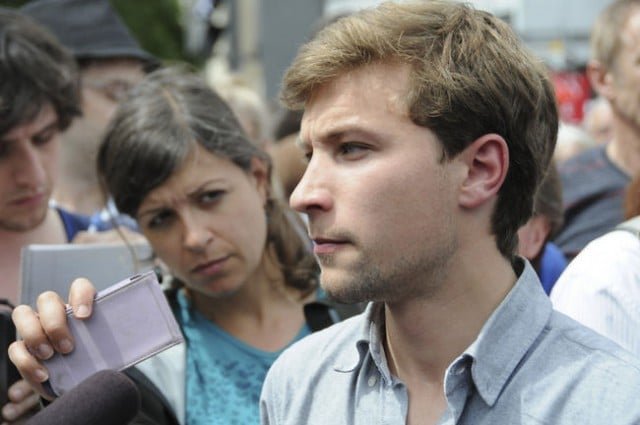
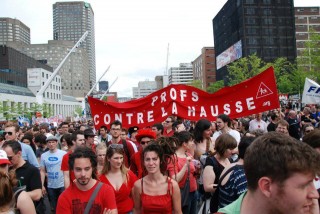
Nadeau-Dubois heads up CLASSE, the Coalition large de l’association pour une solidarité syndicale étudiante. CLASSE is concurrently the most militant and outward-looking of the three student unions who began a strike last winter in opposition to the proposed 75 % tuition hike to be imposed on Quebec students by the government of Premier Jean James Charest.
Many in English-speaking Canada were quick to point out that Quebec has the lowest tuition fees of any Canadian province. In Quebec, however, the inclination has been to look at the forty or so countries including Egypt, Poland, China, Turkey and Brazil where students pay no tuition at all in state-run institutions. The prospect of raising new financial hurdles to entry into post-secondary education arguably cuts against the spirit and intent of Article 26(1) of the Universal Declaration of Human Rights. That provision stipulates that “higher education shall be equally accessible to all on the basis of merit.”
From Occupy to Student Strike to Leadership in the Global Confederacy of Resistance to Corporatism, Kleptocracy, and War Mongering
What started as a student strike is fast evolving into something far greater than the sum of its instigating parts. Debates about the purpose and funding of higher education lead almost inevitably to the posing of larger questions. Ultimately it is the very direction and purpose of public government that is at issue. The activists of le Printemps érable are challenging the Reaganesque policies of hyper privatization, business deregulation and anti-union outsourcing that have been government orthodoxy for over a generation. The transformation by many governments of higher education from a subsidized public good into a commercial product to be marketed to consumers is part of a larger complex of neoliberal ideas and actions that is generating massive resistance throughout the world.
In the final analysis the surge of indigenous support for the Quebec students’ strike is yet one more push back against the exploitation of the 99% by the 1%. Le Printemps érable adds to the momentum of a growing global movement to turn the ship of corporation, state, and citizenship away from the course steered by Ronald Reagan, Margaret Thatcher, and Milton Friedman when they popularized and applied Friedrich Hayak’s attack on Keynesian conceptions of political economy.
At its best the economic strategy mapped out by John Maynard Keynes pictured health, education, culture, and social security as common goods to be nurtured and subsidized by engaged governments responding in the public interest to engaged citizens. The continuing reverence of government operatives for the anti-Keynesian thrust of Reaganesque policies has become an absurdity in light of the socialism for rich people formalized with the great bailout giveaway of 2008-2009. Where’s our bailout? the dispossessed have been asking with growing insistence. The sudden deep freeze of inert credit and debt markets in 2008 because of the speculative excesses of the deregulated financial services industry triggered the biggest upward transfer of capital to the rich in all of recorded history.
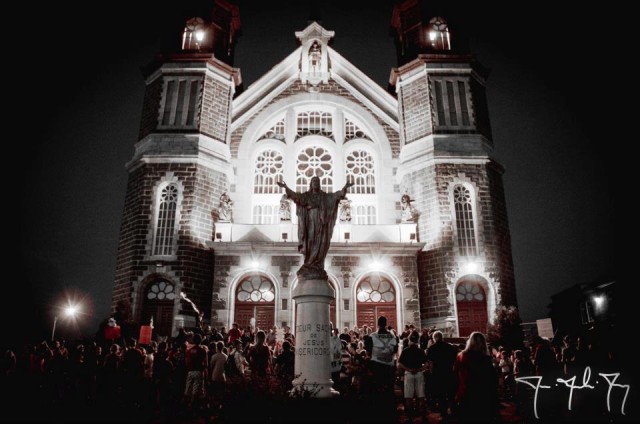 Hence the push to institute government austerity in Quebec and throughout the world flows from the transfer of trillions from present and future taxpayers to the small kleptocractic elite that presently dominate the world’s political economy through the marshalling of mushrooming public debt, unbridled militarism, unrestrained psychological warfare, and the top-down manipulation of captive puppet governments. As CLASSE outlined in a call to action, “While the gifts to the banks and the giant corporations multiply, the poorest members of society and the middle class are given the bill for an economic crisis for which the responsible parties are given a free pass.”[i]
Hence the push to institute government austerity in Quebec and throughout the world flows from the transfer of trillions from present and future taxpayers to the small kleptocractic elite that presently dominate the world’s political economy through the marshalling of mushrooming public debt, unbridled militarism, unrestrained psychological warfare, and the top-down manipulation of captive puppet governments. As CLASSE outlined in a call to action, “While the gifts to the banks and the giant corporations multiply, the poorest members of society and the middle class are given the bill for an economic crisis for which the responsible parties are given a free pass.”[i]
From the Arab Spring, to the emergence of the Indignados in Spain, to the 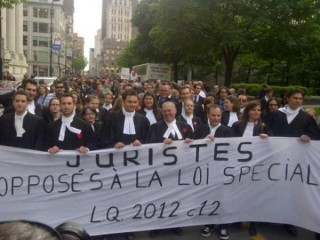 defense of trade unionism in Madison Wisconsin, to the massive Occupy Wall Street phenomenon, and now to le Printemps érable in Quebec, the injustices being addressed are alternatively specific and general, concurrently local, regional, and worldwide. Throughout the planet oppressed groups and individuals are reaching out to one another with the realization that the incursions of the 1% who have benefited most from corporatist globalization must be met with transnational confederacies of resistance. The inroads of imperial globalization must continue to engender tactics of anti-imperial globalization that began in 1492 with resistance of Indigenous peoples to imperial assaults starting with those of Spain and extending to those of France, the Netherlands, Great Britain, the United States and, most recently, Israel.
defense of trade unionism in Madison Wisconsin, to the massive Occupy Wall Street phenomenon, and now to le Printemps érable in Quebec, the injustices being addressed are alternatively specific and general, concurrently local, regional, and worldwide. Throughout the planet oppressed groups and individuals are reaching out to one another with the realization that the incursions of the 1% who have benefited most from corporatist globalization must be met with transnational confederacies of resistance. The inroads of imperial globalization must continue to engender tactics of anti-imperial globalization that began in 1492 with resistance of Indigenous peoples to imperial assaults starting with those of Spain and extending to those of France, the Netherlands, Great Britain, the United States and, most recently, Israel.
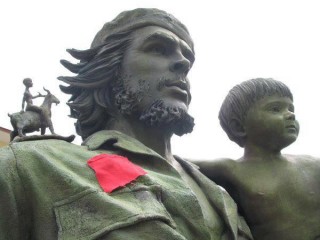 Resisting Debt Enslavement in the 21st Century
Resisting Debt Enslavement in the 21st Century
Our emancipation proclamations have not been applied in ways that are consistent, durable and capable of being maintained as corporatist globalization accelerates the rush to the bottom in terms of wages, benefits, and protections for organized labour. The debt slavery of indentured servants is being refurbished, including through the subordination of young people to the banking regimes that lend them money in order to advance through the increasingly privatized systems of education all around the world.
It is becoming increasingly clear that a primary aim of many of those who have inherited the largest concentrations of capital from human bondage and from colonialism is to continue to push, but by altered means, for the virtual enslavement of the largest part of the human family. The repressions of an increasingly globalized police state are becoming the modus operandi of an empire of private property that treats humans as chattels to be controlled through the systematic deployment of compounding debt, state terror, and unrelenting propaganda.
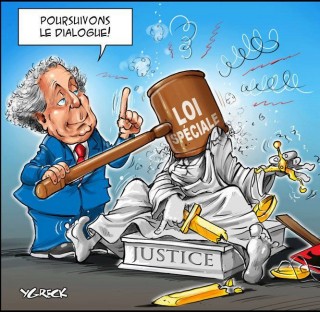
The Corrupt Government of Jean Charest Resorts to a Police State Bludgeon Law
On March 19 Premier Charest pushed Bill 78, sometimes known as the Bludgeon Law, through Quebec’s National Assembly to formalize his government’s growing police-state personality. The legislation was designed effectively to render the strike illegal while placing draconian prohibitions on freedom of assembly and freedom of assembly. Charest’s attempt to outlaw the wearing of masks presented a signal to make masks even more central to the protest’s iconography.
All and all this legislative push is to preempt the political nature of the struggle by pushing the acrimony into the courts where the state maintains the upper hand. Part of the strategy is to impose massive financial penalties for those who fail to adhere to laws that advance the state’s attack on basic civil liberties. The battle lines have been clearly drawn and the fate of the Maple Spring in Quebec is being made a test case with important international ramifications.
Negotiation, Litigation, or Confrontation?
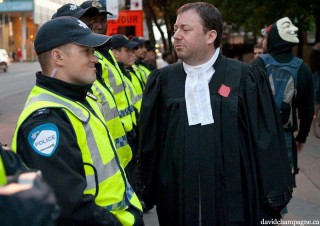 While the pressure of the massive street protests forced the government back into negotiations with the leaders of the three students unions, Guillaume Nadeau-Dubois has been adamant that the contents of Bill 78 itself belong on the negotiating table. Opposition to Bill 78 has widened the domestic base and the international opposition to the police state machinations of the Charest government.
While the pressure of the massive street protests forced the government back into negotiations with the leaders of the three students unions, Guillaume Nadeau-Dubois has been adamant that the contents of Bill 78 itself belong on the negotiating table. Opposition to Bill 78 has widened the domestic base and the international opposition to the police state machinations of the Charest government.
Bill 78 outlaws picketing in front of institutions of higher education. It suspends the normal operations of some educational institutions until August. The statute empowers the police to give or withhold permission to assemble and demonstrate. The latitude allowed for permissible demonstrations is very tightly defined. The enactment’s blanket prohibition on the wearing of masks has rightfully been treated as a particularly offensive violation of free expression.
Taking it to the Streets
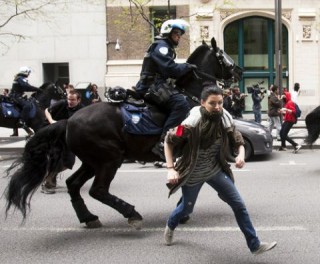 Repeating the enthusiasm of March 22, hundreds of thousands of citizens rallied on May 22 to mark the100-day anniversary of the strike and to show solidarity in their shared rejection of the legitimacy of the government’s invocation of the sweeping new police powers. The supposed emergency measures are to stay in place for a year, a period that conveniently for the Charest government will encompass the next provincial election. In the lead up to the passage of Bill 78 through the Quebec National Assembly Line Beauchamp resigned as Quebec’s Minister of Education. Beauchamp’s departure is indicative of the divisive nature of the initiative even within the Charest Government. This split, extending even into the cabinet of Quebec’s ruling party, signalled many divisions to come. Bill 78 is wedging open public opinion along many fault lines including urban/rural and French/English.
Repeating the enthusiasm of March 22, hundreds of thousands of citizens rallied on May 22 to mark the100-day anniversary of the strike and to show solidarity in their shared rejection of the legitimacy of the government’s invocation of the sweeping new police powers. The supposed emergency measures are to stay in place for a year, a period that conveniently for the Charest government will encompass the next provincial election. In the lead up to the passage of Bill 78 through the Quebec National Assembly Line Beauchamp resigned as Quebec’s Minister of Education. Beauchamp’s departure is indicative of the divisive nature of the initiative even within the Charest Government. This split, extending even into the cabinet of Quebec’s ruling party, signalled many divisions to come. Bill 78 is wedging open public opinion along many fault lines including urban/rural and French/English.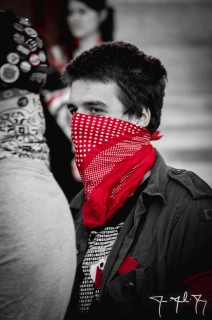
News of Bill 78 spread quickly, sparking solidarity events on May 22 in New York, Toronto, and Vancouver, all cities where Occupy Wall Street activists have faced various forms of attacks on our supposed constitutional protections for freedom of assembly and freedom of expression. Repeating its unwillingness to stand by idly in the face of police violence, the Internet hackers’ alliance known as Anonymous succeeded in shutting down several government web sites in what they are calling Op Quebec.
The pace of solidarity events outside Quebec picked up momentum on May 30 when demonstrators in 70 communities embarked on casserole night in Canada. The pan-Canadian demonstrators clad themselves in the colour of the student strike in the country whose flag features the Red Maple Leaf. The devotees of casserole solidarity replicated the style-setting innovations of the Montreal street protests by incorporating the mass clanging of pots and pans to call attention to the grievances.
Meanwhile police have responded by arresting over 3000 individuals, 700 of them on May 23 in a single kittling operation. Police estimate that 260 individual demonstrations took place in the first 100 days of the strike. At least two protesters have lost eyes from police randomly firing gas-bear projectiles, sound grenades, and rubber bullets into assembles of protesters. The number of injuries on both sides of the barricades has been increasing in a part of Canada that has seen martial law imposed twice, once in 1970 when Prime Minister Pierre Trudeau invoked the War Measures Act and again in 1990 when Mohawk Warriors and Quebec’s provincial police force, the Sûreté du Québec, crossed swords.
Confronting the Lawlessness of Our Law Makers
The response of many intertwined elites to the mobilization of great masses of citizens in the Arab Spring, in the Occupy movement or now in le Printemps érable has been fairly consistent. The more the rising tide of resistance floods into our streets and public squares the more concerted becomes the drive for edified protections for the rich behind heightened walls of police state tyranny. This repressive trend has been developing for a long time.
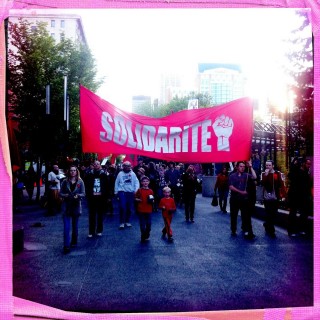
Jails proliferate and are immediately filled with those that Frantz Fanon once described as the wretched of the earth. In the United States the criminalized Others are largely Black, the descendants of slaves. In Canada they are Native people including Crees, Objibways, Mohawks, Mikmaqs, Inuit, Dene and Sto:lo. In Israel they are Palestinians
This criminalization of the dispossessed, the disempowered, and of our most conscientious objectors continues as obvious war criminals such as Dick Cheney, Benjamin Netanyahu, Tony Blair, Barack Obama, and George Bush are allowed to walk free. No police officer, prosecutor, or judge dare publicly call into question the culture of impunity protecting those directing the illegal onslaughts of torture, genocide, and of aggressive warfare from the very pinnacles of the highest order of organized crime, international crime. In this scheme the imagery of the law become an artifice to protect the wealth and unmerited influence appropriated by a massively entitled few from a ruthlessly disentitled many.
As the influence of le Printemps érable spreads it brings new inspiration to those who created the tent villages of an Occupy movement that UK’s Guardian earlier described as a “a game changer.”[ii] The primary target of the protests, the Quebec government of Premier Jean James Charest, finds an even more divisive counterpart in the person of Stephen Harper who came to power as the holder of the Bushite franchise in Canada.
 Will the Makers of a Maple Summer in Canada Turn Their Attention to the Lies and Crimes of Election Fraudster and Bushite Protegé Stephen Harper?
Will the Makers of a Maple Summer in Canada Turn Their Attention to the Lies and Crimes of Election Fraudster and Bushite Protegé Stephen Harper?
Stephen Harper depicts himself as a champion of law and order affording top priority to pushing through plans for a massive extension of Canada’s prison-industrial complex. Can the privatization of the penal system following the abysmal lead of the United States be far behind? Harper recycles the law and order memes of right-wing politicians in the country to the south that incarcerates a higher proportion of its own citizens than any other nation in the world. Harper beats his breast as a get-tough-on-crime sheriff even as he renders the rule of law a sad hoax by blatantly violating the Canadian Election Act to steal the federal vote of May 2, 2011.
The Harper Conservatives, a virtual branch plant of the US Republican Party, have already pleaded guilty to violating provisions of Canada’s electoral law in the federal vote of 2006. Harper’s continued stonewalling of the growing demand for an independent Royal Commission on election fraud in Canada confirms the view of many that he has much to hide.
Harper’s penchant for fraud is illustrated by his hiding a vast array of hugely consequential laws in an Omnibus Bill that is being pushed through the Parliament of Canada. One of the hidden provision formalizes Canada’s hand over of sovereignty by empowering US police officers to arrest people on Canadian soil without going through the due process of extradition. There is ample justification in viewing such a sabotage of Canadian sovereignty as an act of treason.
Harper’s contempt for parliament and the intelligence of the Canadian people is also apparent in his illegitimate government’s lying bare-facedly about a military jet deal involving the purchase of Lockheed Martin’s substandard lemons, the CF-35s. The fraud and corruption of the CF-35 scam makes the Airbus scandal of former Canadian Prime Minister Brian Mulroney look piddling in comparison. Through his appointment of David Johnston as Governor-General, Harper rewarded his fixer who in 2009 diverted a public inquiry looking into Mulroney’s dark financial dealings away from a needed focus on the Airbus file.iii
The Tahrir Square Global Freedom Movement Gathers Momentum
The stink of corruption permeates the Charest regime too. Some of the dark sides of the Charest government will be on display in the course of a judicial inquiry commencing this spring to look at its involvement with leading figures in the crime syndicates that allegedly dominate the construction industry of Quebec. As le Printemps érable blends into the Maple Summer the infusion from Quebec of yet more youthful energy into the Tahrir Square Global Freedom Movement will no doubt continue. Many eyes will be on Guillaume Nadeau-Dubois to see if he will continue to combine the egalitarian spirit of Occupy’s General Assemblies with his own emerging style of leadership through the decisive force of conviction, eloquence, and charm. Nadeau-Dubois presently stands at the head of a movement inspired by almost three centuries of resistance to the domination by a Protestant and English-speaking majority in British imperial Canada.
The British heritage has been superseded in recent decades by an emerging polity of multicultural diversity, a development that creates some anxieties for those communities derived from the makers of French-Aboriginal Canada, the first Canada known to history as New France. Canada’s Anglophone majority has unfortunately not in the past been known for its sensitivity to the needs, interests and rights of les peuples Québécois. Old boundaries are melting away, however, as the need grows for those engaged in confederacies of resistance to put aside old religious, ethnic and linguistic schisms in the cause of anti-imperial globalization .
- [i] Invitation from the Coalition large de l’Association pour une Solidarite Syndicale Etudiant (CLASSE) to a Public Demonstration on April 14 for a Quebec Spring at
- http://www.stopthehike.ca/
- [ii]http://www.guardian.co.uk/commentisfree/cifamerica/2012/may/02/quebec-student-protest-canada
- [iii]Harvey Cashmore, The Truth Shows Up: A Reporter’s Fifteen-Year Odyssey Tracking Down the Truth About Mulroney, Schreiber and the Airbus Scandal ( Toronto: Key Porter Books, 2010)

Anthony Hall is a Professor of Globalization Studies at the University of Lethbridge in Alberta Canada where he has taught for 25 years. Along with Kevin Barrett, Tony is co-host of False Flag Weekly News at No Lies Radio Network. Prof. Hall is also Editor In Chief of the American Herald Tribune. His recent books include The American Empire and the Fourth World as well as Earth into Property: Colonization, Decolonization and Capitalism. Both are peered reviewed academic texts published by McGill-Queen’s University Press. Prof. Hall is a contributor to both books edited by Dr. Barrett on the two false flag shootings in Paris in 2015.
Part II was selected by The Independent in the UK as one of the best books of 2010. The journal of the American Library Association called Earth into Property “a scholarly tour de force.”
One of the book’s features is to set 9/11 and the 9/11 Wars in the context of global history since 1492.
ATTENTION READERS
We See The World From All Sides and Want YOU To Be Fully InformedIn fact, intentional disinformation is a disgraceful scourge in media today. So to assuage any possible errant incorrect information posted herein, we strongly encourage you to seek corroboration from other non-VT sources before forming an educated opinion.
About VT - Policies & Disclosures - Comment Policy

